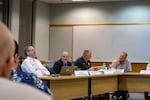
FILE: The district office of Newberg Public Schools pictured in 2022.
Elizabeth Miller / OPB
Newberg-Dundee Public Schools is tackling major financial challenges under a tight deadline. And as of Tuesday, they’re doing so with a different leader at the helm.
Superintendent Stephen Phillips will spend the next two months on leave, as former Newberg Superintendent Paula Radich takes over. According to school board chair Nancy Woodward, Radich is accepting the position for free. Radich will lead the district through an especially tumultuous time.
Oregon law requires all state and local governments — including school districts — to balance their budgets. But this spring, Newberg was millions of dollars short. The news came as a shock not just to community members, but to the district’s own budget committee and school board.
The Newberg school board received news last month that the school district was more than $3.7 million in debt for the current school year. Board members also learned they’d have to deal with a more than $10 million gap in the budget for next school year — a deficit that’s grown since digging into the details.
“This stunning disclosure is as much of a shock to members of the school board as it is to you,” the elected leaders wrote to the Newberg community in a letter in May.
“Despite frequent inquiries of the superintendent on the status of the district budget, the school board was regularly assured that any potential budget shortfall would be managed through savings from staff retirement and resignations.”
Now, they’re facing the final countdown. Budget committee members brought in an outside expert to whip together a spending plan — crafting a budget that would usually take months in a matter of days. The school board has a strict budget approval deadline less than three weeks from now.
The district’s budget committee Monday night approved a $98.9 million proposed budget for next school year. The recommended spending plan heads to the school board, which, by law, has to adopt a budget by the end of the month in order to use the money.
The mid-Willamette Valley district, which enrolled about 4,100 students last year, is not the only school system facing budget issues. Districts across Oregon and southwest Washington are in similar boats. Many have cited expiring federal COVID relief dollars and declining student enrollment among the causes for decreased revenue.
But Newberg is unique in its shock when learning of the district’s current financial standing.
While larger districts like Portland Public and Salem-Keizer public schools have spent months debating what to cut, how to lay off staff and what comes next — and many have already adopted their budgets for next year after weeks of community engagement — Newberg only has a matter of days to get things wrapped up.
Many in the community are frustrated with the confusion and lack of transparency around the budget issues.
Autumn Foster testified during public comment Monday, identifying herself as a parent, voter, taxpayer, supporter of public schools, and the former communications director for the district.
“[During the last budget crisis], we were very transparent with how everything was going to happen,” she told the committee. “We had listening sessions, we put things on our website, we were very clear about what happened and how it was being managed.”
That’s not how things went this year, she said.
“We are not getting any transparency. We have no idea why this happened, how it happened,” Foster said. “You want to talk about why rumors go wild on social media? There’s one way to fix it. You put out information, and [you] have the facts. And then there’s no need for anyone to speculate about anything.”
How did we get here?
At the start of the May 28 budget committee meeting, Phillips read aloud a statement regarding the district’s financial situation.
“As the leader of this district, I fully recognize and understand the level of frustration and disappointment the families of our district are feeling right now,” he said.
Phillips did not respond to multiple requests for comment from OPB on Tuesday. People tuning into the meeting this week online pointed out in the comments that he wasn’t present.
Newberg has endured a unique set of circumstances over the last few years. Conflicts in the district involving former school board members and staff divided school communities and, in the view of some, distracted educators and administrators from their core responsibilities of teaching and supporting students. Phillips is also among a handful of former administrators at a rural Oregon school named recently in a federal lawsuit.
Phillips last month said there were three key causes of Newberg’s recently discovered budget crisis.
The first issue, he said, is the “structural deficit” in the state’s funding mechanism, which he argued is “failing districts across the state.” He accounted for a loss of about $4.4 million from declining enrollment, which is the core factor in Oregon’s school funding formula.
Many school districts in Oregon have seen enrollment fall due to changing demographics, families relocating and parents choosing other schools for their children.
“The increase of families leaving the district for private schools, online, charters, homeschooling and other local districts negatively impacts our revenue and ability to scale services and programs effectively,” Phillips said. “The last five years, we have seen a drop in enrollment of 18%.”
By comparison, Portland Public Schools, Oregon’s largest school district, has seen a drop of about 7% in roughly the same time frame.
“While I support families in making educational decisions that are unique and specific to their children, their beliefs, their resources and their needs, this is a challenge we face as a district to offer competitive and specialized programs to those families, while in parallel, operating with reduced revenue,” Phillips said.
The second factor, he continued, was “special program costs,” which he said outpaced the district’s original budget projections by $1.4 million. Others have described these added costs to schools as “heightened students needs.” This factor is again common to many schools, as recent analyses of schools across the country show that schools are having a hard time stretching their resources to serve students with greater mental health and learning needs.
“We continue to see the impact of the pandemic on the emotional, social and academic needs of our students,” Phillips told the budget committee. “Our one-to-one needs and specialized learning accommodations have risen proportionally. The responsibility for this overspending lies with me as special programs and the students in these programs were among my highest priority.”

FILE: Newberg superintendent Stephen Phillips pictured on Sept. 13, 2022.
Elizabeth Miller / OPB
And the third reason, he said, was the “fund creep,” or a tendency of departments to overspend.
“Over the course of this year, $2.9 million was spent that was beyond budget,” Phillips said. “Collectively, all pre-budget areas share an overarching theme: the failings of my district office, our financial safeguard practices, and checks and balances.
“We were not diligent in the week-to-week and month-to-month budget analysis,” he said. “These mistakes should have been caught earlier.”
There has been talk of removing Phillips as superintendent in light of these events. A Change.org petition has circulated online, started by a group called Newberg Neighbors For a Better School Board, demanding changes at the top of the district.
The petition, which had garnered more than 1,400 signatures by Monday, calls for Superintendent Phillips, Deputy Superintendent Scott Lindenberger, and Director of Finance Heather Bixby to resign.
Phillips told the budget committee in May that should the board retain him as superintendent, he would immediately institute a new practice of “monthly checks and balances,” along with standing meetings with the business manager and select board members “to ensure financial integrity and sustainability.”
He was also prepared for a reduction in force, starting in his office. Phillips said he would forgo any anticipated salary or fringe increases for the next year. And they will “lean down” the district office’s internal staff by nearly 25%.
“I know that apologizing is not enough, but I am sorry,” he said. “I have shared with board leadership that I serve at their discretion. Our children have been and will continue to be my very first priority.”
Scrambling to balance the budget
In order to quickly balance the district’s budget, Newberg-Dundee requested the help of Jackie Olsen, executive director of the Oregon Association of School Business Professionals.
Olsen was tasked with creating a balanced budget proposal in a little over a week. She told the committee Monday night that two other business officials have reviewed her work, but there are bound to be some mistakes. Typically, she said, they would have months to do this.
Olsen went through the budget and made sure the numbers were accurate. Newberg staff had been $12 million off in their expectations for incoming revenue.
And despite recommended savings from Olsen, the district still needs to do more. The goal is for the ending fund balance for this year to match the beginning fund balance for next year.
The district was in the red by $3.7 million when Olsen first got involved. She told the committee she’s been able to reduce the shortfall to $1.7 million as of Monday, but the goal is to find sufficient savings to break even by the time the budget is adopted at the end of the month.
“I hate to say our goal is zero because we never want a zero beginning fund balance,” she told the committee, “but that’s really where you are right now.”
In order to reduce costs, Olsen proposed cutting more than 60 full-time equivalent positions, instituting one-time furlough days for staff and postponing the district’s previously planned science and health curriculum adoptions.
Olsen considered other options. She told the committee the district did not meet the requirements to get a short-term loan, and the committee members agreed that closing a school at this point would not make sense to fix the crisis at hand.
“Jackie has done exactly what we asked her to do: to give us a budget that is in line with the revenue that we’re actually receiving because what we had received from staff was $12 million more than we were going to receive,” vice chair of the committee Claire Hertz said to the group Monday night. Hertz is a retired school finance administrator, who worked for Portland Public Schools and the Beaverton School District.
“So, I, as vice chair of the budget committee, feel comfortable approving this budget tonight because we’ve gone through [it], we understand how the revenue’s coming in, and we’ve reduced expenditures across the board to create a balanced budget,” she continued. “The hard work is still going to be done.”

FILE: Newberg staff and board members at a board meeting on Sept. 13, 2022. From left: Director of Human Resources Scott Lindenberger, Superintendent Stephen Phillips, then-board chair Dave Brown, and board member Trevor DeHart.
Elizabeth Miller / OPB
The proposed budget now heads to the school board. According to committee documents, the school board is scheduled to vote on the budget adoption on June 24.
After the budget is adopted by the school board, the budget committee has recommended the board conduct an inquiry. They also recommended the board establish a finance committee that will review the financial status of the district throughout the year and make necessary budget adjustments when needed.
Drew Gallagher, president of the Newberg Education Association, which represents roughly 280 educators in the district, said the union is hopeful the board will take action to lead Newberg in the right direction.
“[As] things stand, we aren’t sure that Newberg-Dundee schools can continue recovering from this mess and enter the build-back phase without more clarity and information about what actually happened,” he said in an email Tuesday afternoon. He added that leadership at the district office needs to work with the licensed and classified staff to get them there.
“Unfortunately, we know it will take time and most likely go into the summer, which is not what anyone wants but might be a reality at this point,” Gallagher said. “The books ‘should be’ reconciled by June 30th, but those of us who have gone through this know it might be even longer.
“It breaks our heart that this is happening to our community, our teachers, and our staff in general.”
Editor’s Note: This story was updated to reflect the school board’s approval of change in district leadership.
